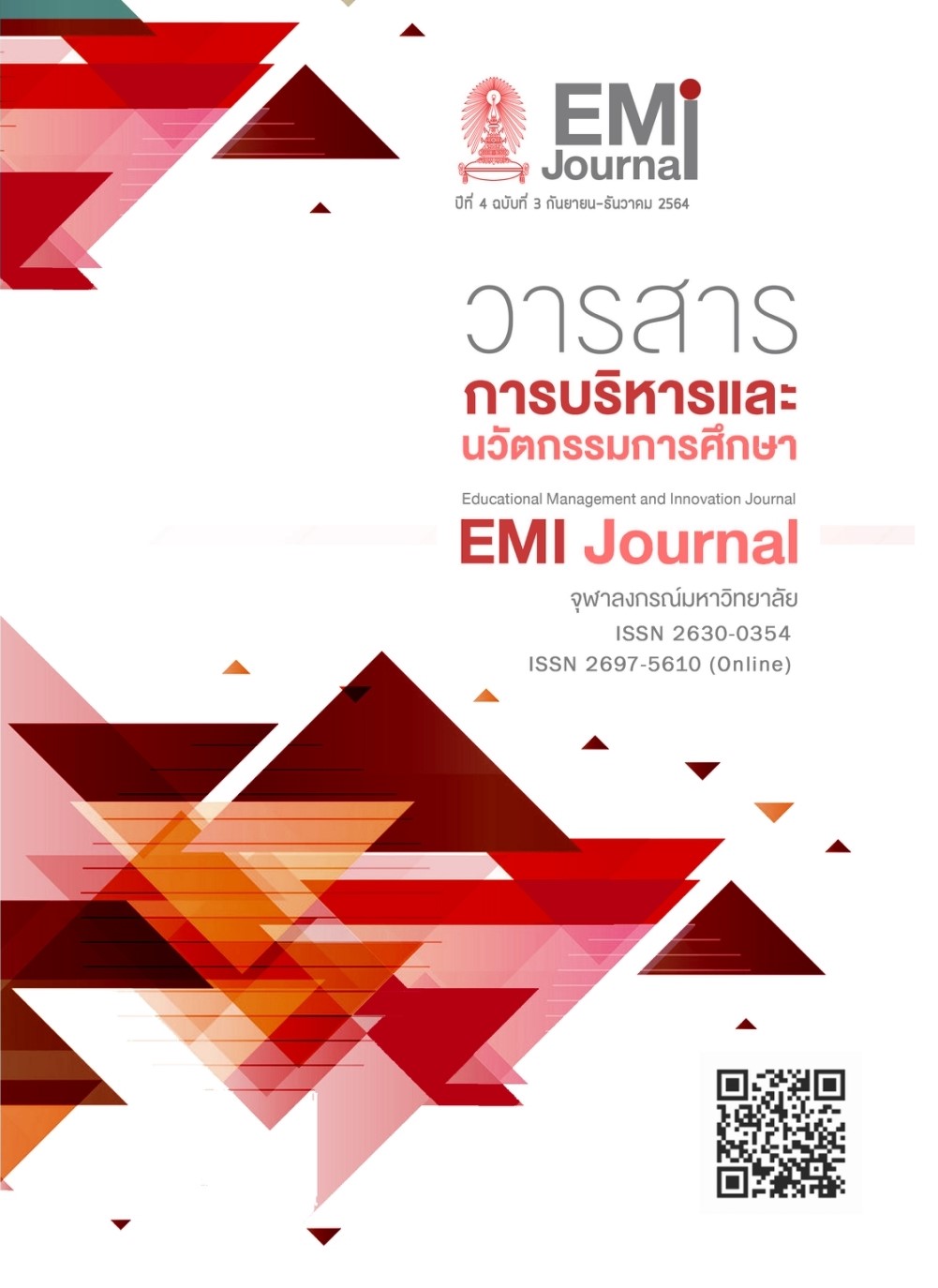การศึกษาความสัมพันธ์ระหว่างภาวะผู้นำเชิงสร้างสรรค์กับประสิทธิผลของมหาวิทยาลัย
การศึกษาความสัมพันธ์ระหว่างภาวะผู้นำเชิงสร้างสรรค์กับประสิทธิผลของมหาวิทยาลัย
คำสำคัญ:
ภาวะผู้นำเชิงสร้างสรรค์, ประสิทธิผลของมหาวิทยาลัยบทคัดย่อ
การวิจัยครั้งนี้มีจุดมุ่งหมายเพื่อศึกษา 1) ระดับภาวะผู้นำเชิงสร้างสรรค์ของผู้บริหารมหาวิทยาลัย 2) เพื่อเปรียบเทียบความแตกต่างของค่าเฉลี่ยระดับความคิดเห็นภาวะผู้นำเชิงสร้างสรรค์ของผู้บริหารมหาวิทยาลัย จำแนกตามปัจจัยส่วนบุคคล 3) ความสัมพันธ์ระหว่างภาวะผู้นำเชิงสร้างสรรค์กับประสิทธิผลของมหาวิทยาลัย 4) เพื่อเสนอแนะแนวทางพัฒนาภาวะผู้นำเชิงสร้างสรรค์ของผู้บริหารมหาวิทยาลัย กลุ่มตัวอย่างในการวิจัยได้แก่ ผู้บริหารมหาวิทยาลัย สังกัดกระทรวงการอุดมศึกษา วิทยาศาสตร์ วิจัยและนวัตกรรม จำนวน 310 คน เลือกกลุ่มตัวอย่างโดยใช้เทคนิคการสุ่มตัวอย่างแบบง่าย เครื่องมือที่ใช้ในการวิจัย คือ แบบสอบถามตรวจสอบความเที่ยงตรงเนื้อหา (Content validity) เพื่อหาค่า IOC ได้ค่าตั้งแต่ 0.80-1.00 และค่าความเชื่อมั่นของเครื่องมือเท่ากับ 0.944 สถิติที่ใช้ในการวิเคราะห์ข้อมูล ได้แก่ ค่าเฉลี่ย ค่าส่วนเบี่ยงมาตรฐาน และสัมประสิทธิ์สหสัมพันธ์อย่างง่ายของเพียร์สัน (Pearson’s Product Moment Correlation Coefficient)
ผลการวิจัยพบว่า 1) ระดับภาวะผู้นำเชิงสร้างสรรค์ของผู้บริหารมหาวิทยาลัยโดยรวมอยู่ในระดับมาก 2) ระดับค่าเฉลี่ยระดับความคิดเห็นภาวะผู้นำเชิงสร้างสรรค์โดยรวมอยู่ในระดับมากทั้งภาพรวมและองค์ประกอบรายด้าน รวมถึงพบว่ามีความแตกต่างกันอย่างมีนัยสำคัญทางสถิติที่ระดับ 0.05 3) ภาวะผู้นำเชิงสร้างสรรค์กับประสิทธิผลของมหาวิทยาลัยพบว่ามีความสัมพันธ์ไปในทิศทางเดียวกันอย่างมีนัยสำคัญทางสถิติที่ระดับ 0.01 4) สนับสนุนการตอบสนองเชิงจินตนาการให้เกิดความสร้างสรรค์ พร้อมทั้งให้ความไว้วางใจ โดยที่ผู้บริหารมุ่งสร้างแรงบันดาลใจให้แก่บุคลากรและการสร้างแรงจูงใจด้วยวิธิการใหม่ ๆ เพื่อให้บรรลุตามวัตถุประสงค์ของมหาวิทยาลัย
Downloads
เอกสารอ้างอิง
Chamchoy, S. (2012). Concept of innovation for school management in the 21st century. Journal of Education Naresuan University, 14(2), 117-128. [in Thai]
Chongsatityoo, C. (2012). Education management to enhance the quality of learning in the area by network. Thailand Education Journal, 11(116), 3-11. [in Thai]
Jinarat, V. (2014). Data analysis by inferential statistics. UMT Poly Journal, 11(2), 80-85. [in Thai]
Julsuwan, S. (2020). A study of the relationships between adaptive leadership and effectiveness of the administration schools of office the basic education commission. UMT Poly Journal, 17(2), 28-40. [in Thai]
Lunsomrong, P., Sikkhabandit, S., & Sithiamorn, P. (2017). A Model of Creative Leadership Development of Basic School Administrators under the Nakhonratchasima Primary Educational Service Area Office. Journal of Industrial Education, 11(1), 63-72. [in Thai]
Manusawat, P. (2010). A Model for Effective Student Affairs Administration of Private Universities in Thailand. EAU Heritage Journal Social Science and Humanities, 1(1), 126-138. [in Thai]
Min Basadur. (2008). Leading others to think innovatively together: Creative leadership. The Leadership Quarterly, 15 (2004), 103-121.
Ministry of Higher Education, Science, Research and Innovation. (2020). Higher Education Information Dissemination System. Retrieved May 29, 2019, from
http://www.info.mua.go.th/info [in Thai]
Office for National Education Standards and Quality Assessment. (2020). Education Standards and Quality Assessment. Bangkok: Office for National Education Standards and Quality Assessment. [in Thai]
Office of the Education Council. (2008). Educational development direction framework during the development plan National Economy and Society Issue 10 (2007-2011) Consistent with the national education plan (20022016): Summary
(2nd ed.). Bangkok: Chulalongkorn University Printing House. [in Thai]
Office of the Ministry of Higher Education, Science, Research and Innovation. (2020). Annual government action plan 2021. Bangkok: Office of the Ministry. [in Thai]
Pasunon, P. (2014). Reliability of Questionnaire in Quantitative Research, Parichart Journal Thaksin University, 27(1), 144-163. [in Thai]
Pounder, J. (2001). “New leadership” and university organizational effectiveness: exploring the relationship. Leadership & Organization Development Journal, 22(6), 281-290
Ramsiri, P., Swaengsakdi, T., & Thepsaeng, S. (2018). A Development of Creative Leadership Model of Education Institute Administrators Under Local Administrative Organization. SWU eJournals, 15(28), 12-25. [in Thai]
Rattanapan, P., & Chaipan, S. (2018). Structural Causal Factors of Changing Leadership and Attribute for Educational Administrators Affecting on Efficiency of Administration in Private University. Business Review, 10(1), 73-91. [in Thai]
Robert J. Sternberg. (2003). A propulsion model of creative leadership. The Leadership
Quarterly, 14(2003), 455-473.
Sarah E. Danner. (2008). Creative Leadership in Art Education: Perspectives of an Art
Educator. (Master’s thesis, Ohio University).
Sinlarat, P. (2010). Creative and Productivity Leaders: New Paradigms and New Leaders in Education. Bangkok: Chulalongkorn University Printing House. [in Thai]
Stoll, L. & Temperley, J. (2009). Creative Leadership: A Challenge of Our Times. School Leadership and Management, 29(1), 63-76.
Sukjairungwattana, T., & Kheovichai, K. (2015). Development of Proposed Policy for Creative Leadership Enhancement for Leaders of students Union in Higher Education Institutions in the Next Decade (2014-2023). Silpakorn Education Research Journal, 7(2), 191-206. [in Thai]
Taweekul, P. (2017). Creative leadership of the administrators of the student affairs department based on the views of the students and staff of the student affairs department Phayao University. Independent study, Faculty of Education of Phayao University. [in Thai]
Tongpunchung, P. (2013). The Causal Structural Relationship Model Transformational Leadership of The President Influencing Effectiveness of Rajabhat University. Journal of educational administration burapha university, 5(1), 76-88. [in Thai]
Wutthirong, P. (2012). Innovation management: resource learning organization and innovation. Bangkok: Chula Book Center. [in Thai]



